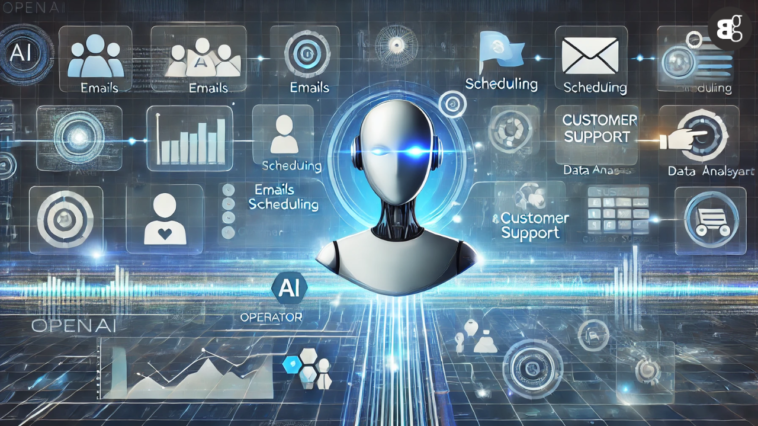Operator, a ground-breaking AI agent created by OpenAI, was just released. Its purpose is to automate web-based chores for consumers. This invention provides a preview of the future of agent-driven automation at a time when artificial intelligence is seeing an increase in competitiveness. With the help of OpenAI’s state-of-the-art Computer-Using Agent (CUA) model, the operator can interact with websites like that of human users, performing tasks like typing, scrolling, and clicking. The main characteristics, advantages, and ramifications of this ground-breaking tool are examined below.
What Is OpenAI’s Operator?
Operator is an AI agent developed by OpenAI to handle repetitive and time-consuming online tasks. It can autonomously navigate websites, interact with menus, fill out forms, and complete various tasks on behalf of users. From booking reservations and ordering groceries to planning vacations, Operator is designed to simplify everyday activities.
How It Works
The operator leverages OpenAI’s CUA model, which combines the vision capabilities of the GPT-4o model with advanced reasoning skills. Instead of relying on APIs, the Operator mimics human interactions with graphical user interfaces (GUIs), enabling it to click buttons, type text, and make selections.
Availability
Currently available to Pro users in the U.S. as part of a research preview, Operator can be accessed via a $200/month ChatGPT Pro subscription. OpenAI plans to roll out this feature to users on the Plus, Team, and Enterprise tiers, with future expansions to other countries, though Europe may experience delays due to regulatory challenges.
Read More: OpenAI’s Next Big Model Is Expensive And Very Late: GPT-5 (Codenamed Orion)
Key Features of Operator
1. Automation Across Multiple Domains
The operator is designed to perform various tasks, such as:
- Travel and Dining: Booking flights, hotels, and restaurant reservations.
- Shopping: Browsing and purchasing items online.
- Task Management: Creating to-do lists and reminders.
2. User Confirmation for Security
For sensitive tasks like entering login credentials or making payments, the Operator seeks user confirmation to ensure security and accuracy.
3. Simultaneous Task Handling
Users can run multiple tasks concurrently, such as ordering an item online while booking a campsite.
4. Dynamic Restrictions
Operators include safeguards to prevent misuse, such as avoiding certain sensitive actions like sending emails or deleting events.
Competitive Landscape
Rival Developments
Other companies are also innovating in the agent-driven AI space:
- Anthropic’s Claude AI: Introduced a “computer use” feature allowing developers to control a user’s mouse and keyboard for web automation.
- Google’s Gemini 2.0: Launched advanced agent capabilities, including real-time web interaction and task automation.
Despite similar functionalities, Operator differentiates itself with its focus on user supervision and robust safety measures.
Applications and Limitations
Potential Uses
Operator has immense potential to streamline repetitive tasks and save time, especially for:
- Businesses: Automating customer engagement and e-commerce processes.
- Individuals: Managing personal errands, planning events, and more.
Known Limitations
The operator is still in its early stages, with several challenges:
- Complex Interfaces: Struggles with intricate or highly customized websites.
- Security Measures: Cannot handle banking transactions or CAPTCHAs.
- Error Rate: Achieves a success rate of 58.1% on web-based tasks, indicating room for improvement.
Addressing Safety Concerns
The autonomous nature of AI agents raises questions about misuse and security. OpenAI has implemented several safeguards to address these concerns:
- User Supervision: The operator requires user input for critical tasks.
- Partnerships: Collaborates with companies like DoorDash, Instacart, and Uber to ensure compliance with terms of service.
- Research Preview: Gradual rollout to refine functionality and gather user feedback.
Read More: OpenAI’s Search Engine is Now Officially Live In ChatGPT
Broader Implications of Agent-Based AI
Transforming Everyday Life
AI agents like Operator represent a significant shift in how individuals interact with technology. By automating mundane tasks, these tools free up time and energy for more meaningful activities.
Business Impacts
For businesses, agent-driven AI opens new avenues for customer engagement, streamlines operations, and enhances productivity. However, it may also disrupt traditional models, particularly in industries relying on manual online interactions.
Conclusion
OpenAI’s Operator is a bold step forward in the evolution of artificial intelligence. By automating web-based tasks and integrating advanced reasoning capabilities, it promises to transform how users interact with technology. While still in its infancy, the Operator’s potential to simplify everyday life and reshape business operations is undeniable.
As OpenAI continues to refine this tool and expand its availability, Operator is set to become a cornerstone in the growing field of agent-driven AI. Whether you’re an individual seeking efficiency or a business aiming to enhance engagement, Operator offers a glimpse into the future of automation.





